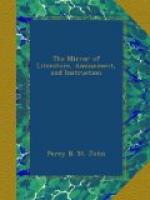But that his nature was not altogether altered, and that notwithstanding his education, which, as Ovid says,
“Emolit mores, nec sinit esse feros,"[9]
he was still a hawk in spirit, was proved on an occasion of almost equal interest. A neighbour had sent us a very fine specimen of the smaller horned owl (Strix brachyotus,) which he had winged when flying in the midst of a covey of partridges; and after having tended the wounded limb, and endeavoured to make a cure, we thought of soothing the prisoner’s captivity by a larger degree of freedom than he had in the hen-coop which he inhabited. No sooner, however, had our former acquaintance, the hawk, got sight of him, than he fell upon the poor owl most unmercifully; and from that instant, whenever they came in contact, a series of combats commenced, which equalled in skill and courage any of those which have so much distinguished that great hero [?], who to the boldness and clearness of vision of the hawk unites the wisdom of the bird of Athens. The defence of the poor little owl was admirably conducted: he would throw himself upon his back, and await the attack of his enemy with patience and preparation; and, by dint of biting and scratching, would frequently win a positive, as he often did a negative, victory. Acquaintanceship did not seem, in this case, likely to ripen into friendship; and when his wing had gained strength, taking advantage of a favourable opportunity, the owl decamped, leaving the hawk in possession of his territory.
The fate of the successful combatant was, however, soon to be accomplished; for he was shortly after found drowned in a butt of water, from which he had once or twice been extricated before, having summoned a deliverer to his assistance by cries that told he was in distress. There was great lamentation when he died, throughout the family; and it was observed by more than one person, that that portion of the dovecote in which he was wont to pass the night was for some time unoccupied by the pigeons with whom he had lived so peaceably, even during his wars with the unfortunate owl.
[9] “Softens the manners, nor permits to be cruel.”
* * * * *




